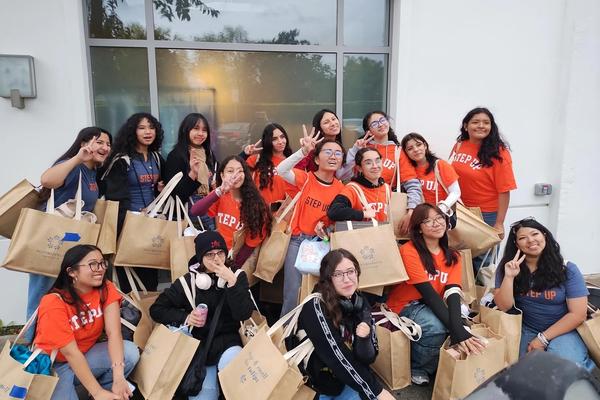At Step Up, we believe that ethnocultural empathy is a vital component of mentoring, where long-term positive relationships thrive on authenticity, empathy, collaboration, and genuine companionship. By embracing ethnocultural empathy, we can support and uplift others more effectively, fostering meaningful connections that drive both personal and community growth.
Here is why ethnocultural empathy is important:
- It allows us to understand another person's perspective.
- It promotes cultural sensitivity to perspectives, backgrounds, and values that may be different than your own.
- It builds trust in communities.
To date, the Scale of Ethnocultural Empathy (SEE) is the only formally published measurement of ethnocultural empathy. The SEE is a tool that measures our ability to empathize with people from different cultures and helps us see how well we connect with people from different backgrounds. [8]The SEE is composed of three instrumental aspects: intellectual empathy, empathic emotions, and the communication of those two.
Let's look at each component and how it can be applied to a mentoring session.
Intellectual Empathy
Intellectual Empathy is about understanding how someone from a different racial or ethnic background thinks and feels. It means that we attempt to see the world through their eyes and understand their experiences.
Example: A young adult is dealing with pressure from their family regarding career choices. In this situation, applying intellectual empathy would require active listening and understanding the role of cultural expectations in their career decisions. A sample response might be...
“It sounds like you’re feeling a lot of pressure from your family about your career path. Can you explain how your cultural background and family expectations are influencing these decisions?”
Empathetic Emotions
Empathic Emotions focuses on feeling the emotions of people from other cultures. It’s about being able to share in their feelings, like their joy or pain, as if those emotions were your own.
Example: A mentee is feeling anxious about their upcoming college entrance exams and feels overwhelmed by the pressure. In this situation, applying empathetic emotions would mean that we would validate the mentee’s emotions by acknowledging and validating their feelings. A sample response might be...
“I can see how stressed you must be about these exams. It’s a lot of pressure, and it’s completely normal to feel anxious. I’ve been through similar situations, and I understand how tough it can be. I’m here to help you through this.”
Communicative Empathy
Communicative Empathy involves showing your understanding and feelings through words or actions. It’s about both feeling empathy and expressing it in a way that others can see and understand.
Example: A mentee is stressed about balancing schoolwork with family responsibilities. In this situation, applying communicative empathy would require clear communication. We would acknowledge their struggle and reflect their feelings. A sample response might be...
“I understand that balancing school with family responsibilities is really tough. It sounds like you’re juggling a lot. Have you tried setting up a flexible study schedule that allows you to manage both effectively? It could help to prioritize your tasks based on deadlines and importance.”
The Importance of Ethnocultural Empathy in Mentoring
According to MENTOR, "long-term positive mentoring relationships develop through demonstrating positive relationship behaviors such as authenticity, empathy, collaboration, and companionship." These principles are part of the Elements of Effective Practice for Mentoring, which are research-informed and practitioner-approved standards. These standards are designed to help create and sustain quality youth mentoring programs, ultimately fostering impactful mentoring relationships. Incorporating the principles of ethnocultural empathy into mentoring can significantly enhance the effectiveness and impact of these relationships. Here’s why:
- Fostering Inclusive Mentoring Relationships
- Enhancing Communication
- Supporting Personal and Professional Development
- Promoting Equity and Inclusion
- Enhancing Self-Awareness and Growth
Putting it All Together
Ethnocultural empathy is like a bridge that connects us with others. It’s all about stepping into someone else’s shoes and understanding where they’recoming from. Using the Scale of Ethnocultural Empathy (SEE) helps us get better at this by breaking it down into understanding thoughts, sharing feelings, and expressing that understanding clearly.
Thank you for Stepping Up and supporting the next generation of leaders.
View the recording of the live virtual session here
Note: All of Step Up’s Training is informed by the National Mentoring Organization MENTOR’s Elements of Effective Practice for Mentoring, for more information view here - Elements of Effective Practice for Mentoring
Learn how to Be a Mentor here!
View our upcoming mentoring opportunities here!
Interested in Corporate Partnership? Click Here!
If you’veparticipated in 2024 programming fill out this survey!
Questions about Mentorship? Email mentor@suwn.org



